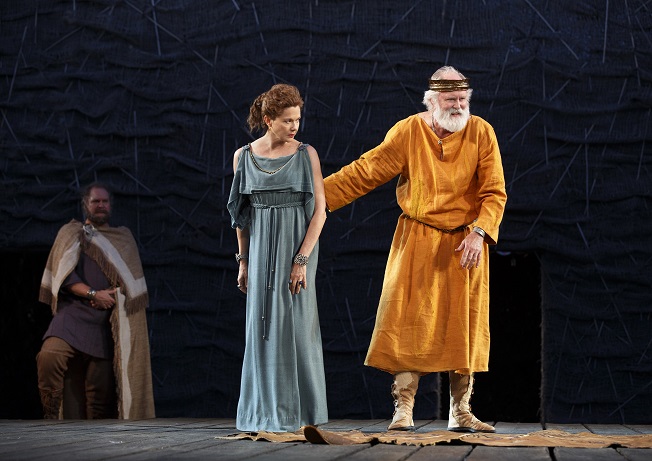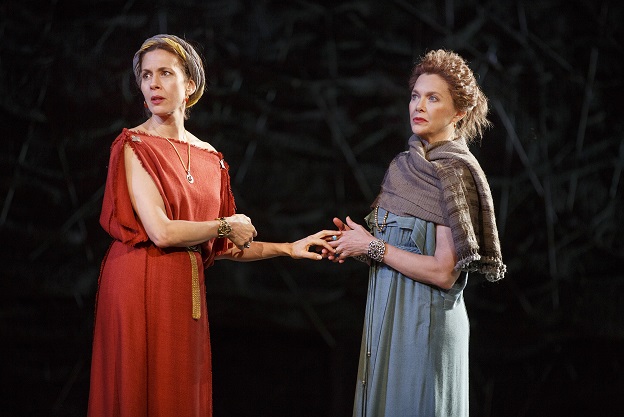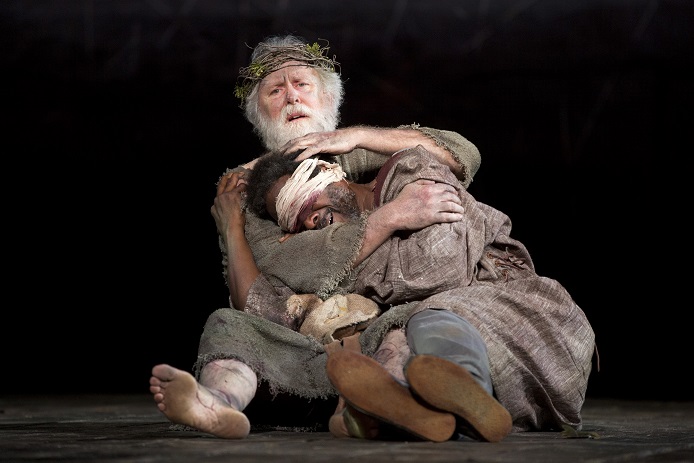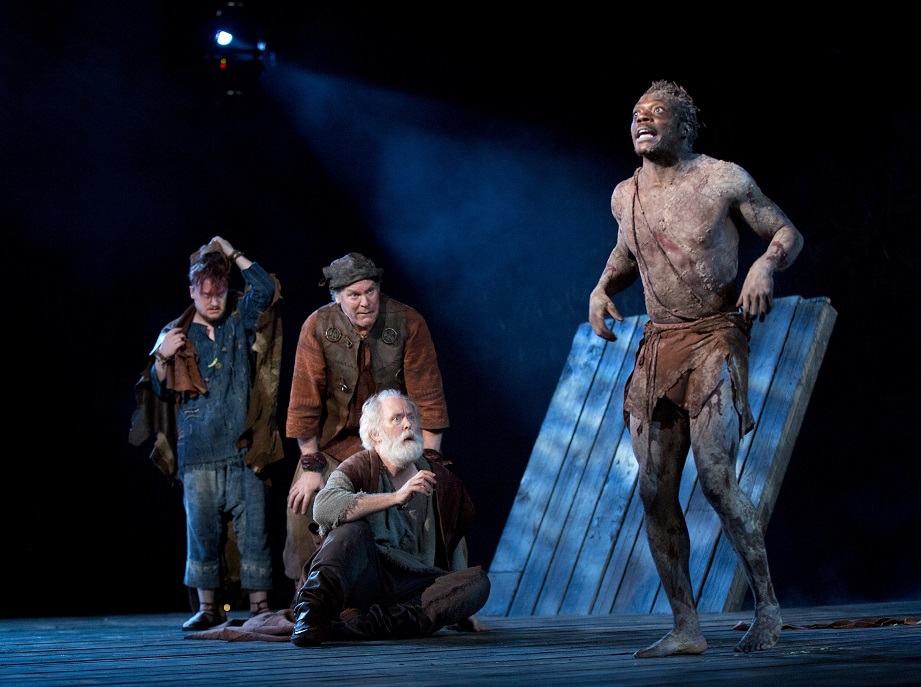Scene
"All my hair in knots": King Lear at the Public Theater free Shakespeare in the Park
by Cristina Alfar. Written on 2014-08-13. Published in Reviews from the ISE Chronicle.
For the production
![]() King Lear (2014, Free Shakespeare in the Park — Public Theater, USA)
King Lear (2014, Free Shakespeare in the Park — Public Theater, USA)
What is most striking for this viewerʼs experience of The Public Theatreʼs free Shakespeare in the Park production of King Lear (Delacorte Theater in Central Park) is the intractable ugliness of the play. Its male characters are, perhaps first and foremost, relentlessly misogynist. The ascendance of Goneril and Regan to the throne is not objectionable insofar as they are poor choices, but insofar as they are women. In this production, directed by Daniel Sullivan and starring John Lithgow (Lear), Annette Bening (Goneril), and Jessica Hecht (Regan), with a break-out performance by Chukwudi Iwuji (Edgar), the language of the play is heightened and rendered new by actors whose facility with the language and clarity of purpose magnify the playʼs ugliness, its lack of love and compassion. The playʼs reiteration and revision of notions of “nothing,” its dependence on personal insult (“thou marble-hearted fiend,” “Detested kite!” “knave, beggar, coward, pandar, and the son and heir of a mongrel bitch,” “thou art a boil / A plague-sore, an embossed carbuncle, / In my corrupted blood,” “Milk-liverʼd man!” “thou art a fiend, / A womanʼs shape doth shield thee”) reaches the audience with clarity and violence. A lack of human connection was, probably accidentally, compounded by a microphone system that made the characters distractingly separate from their voices, separate from each other, so that communication was doubly alienated from intent, from connections to hope or desire or ambition. (Their voices also lost resonance, and it strikes me that actors do not seem to learn anymore just to project, to protect their voices with their diaphragms—much Broadway theater also uses microphones to amplify voices.) The actors moved comfortably on the gorgeous, minimalist wooden platform set (with scenic design by John Lee Beatty), against a scrim crisscrossed with long, slender rods, or dowels, on which was projected the suggestion of a castle wall, or trees and landscape and, of course, a storm with lightening. Lighting by Jeff Croiter beautifully created shifts from one location to the next as well as shifts in mood and space.
While it is traditional to see the playʼs pathos as belonging to Lear and Gloucester,
whose children grab so relentlessly at power that they sacrifice fathers and humanity
to grasp it, this production offers little to win sympathy. Mr. Lithgowʼs Lear begins
the play in confidence of his choice to split his kingdom into three, and the map,
spread center stage on the floor,  showed clearly his intent to give Cordelia the largest portion though he says his
daughters will compete for that distinction. But very quickly, this Lear showed signs
of mental instability, reaching what the actor himself calls the first “temper tamtrum”
within a few lines of Cordeliaʼs refusal to speak (“Learning ‘Learʼ: John Lithgowʼs Shakespeare in the Park Diary,” New York Times, June 18, 2014). The effect is to offer credibility to Gonerilʼs claim that their fatherʼs irrational
decision to “cast off” Cordelia may portend future troubles with him for herself and
her sister, Regan. Neither of the sisters is excited by Learʼs love contest, and while
Gonerilʼs reply is more sure—seemingly agreeing to play her fatherʼs game as she warms
to her declaration of love— she also indicates the map on the floor very clearly as
she declares that she loves him “Beyond what can be valued, rich or rare” (ISE King Lear, 1.1.57). Reganʼs reply is hesitant, seemingly at a loss for words as well as of self-confidence.
She can come up with nothing other than words her sister has already spoken, but her
fatherʼs clear displeasure with such repetition both frightens her and goads her on.
Through the first two acts, Ms. Beningʼs performance gives weight to a view of a reasonable
Goneril as she grows exasperated with a rowdy group of knights whose loud and disorderly
gathering can be heard off-stage. Add to this Reganʼs and Cornwallʼs (Glenn Fleshler)
sincere request for advice from the Earl of Gloucester (Clarke Peters) and the production
appeared interested in exploring both the domestic and professional hazards of taking
over a business from a parent who seems to suffer from dementia.
showed clearly his intent to give Cordelia the largest portion though he says his
daughters will compete for that distinction. But very quickly, this Lear showed signs
of mental instability, reaching what the actor himself calls the first “temper tamtrum”
within a few lines of Cordeliaʼs refusal to speak (“Learning ‘Learʼ: John Lithgowʼs Shakespeare in the Park Diary,” New York Times, June 18, 2014). The effect is to offer credibility to Gonerilʼs claim that their fatherʼs irrational
decision to “cast off” Cordelia may portend future troubles with him for herself and
her sister, Regan. Neither of the sisters is excited by Learʼs love contest, and while
Gonerilʼs reply is more sure—seemingly agreeing to play her fatherʼs game as she warms
to her declaration of love— she also indicates the map on the floor very clearly as
she declares that she loves him “Beyond what can be valued, rich or rare” (ISE King Lear, 1.1.57). Reganʼs reply is hesitant, seemingly at a loss for words as well as of self-confidence.
She can come up with nothing other than words her sister has already spoken, but her
fatherʼs clear displeasure with such repetition both frightens her and goads her on.
Through the first two acts, Ms. Beningʼs performance gives weight to a view of a reasonable
Goneril as she grows exasperated with a rowdy group of knights whose loud and disorderly
gathering can be heard off-stage. Add to this Reganʼs and Cornwallʼs (Glenn Fleshler)
sincere request for advice from the Earl of Gloucester (Clarke Peters) and the production
appeared interested in exploring both the domestic and professional hazards of taking
over a business from a parent who seems to suffer from dementia.
Yet this production, at least, also demonstrated the impossibility of sustaining such a view, for while the sisters at first see eye to eye on matters of state, they soon devolve into a shabby and stupid rivalry for Edmund. Any possible explanation for Gonerilʼs attraction to Edmund is lost, coming out of the blue in Act 4, scene 2 without any even visual indication of her admiration for him or exasperation with her husband in earlier scenes (since there is no textual indication before this moment). The kiss between the two here, initiated by Goneril, felt sudden, as if we had missed something. Similarly, Reganʼs overtures—especially in Ms. Hechtʼs performance, which made Regan a tentative, insecure, almost flighty participant in ruling the nation until Gloucesterʼs letter is intercepted— show as weakness, as the beginning of a rivalry with her sister that was not in evidence before and could not be explained (this interpretation is also at odds with her later self-assurance in Act 3, scene 7, that begins by ordering Gloucesterʼs death, “Hang him instantly” [ISE Lear, 3.7.5]). As a result, each successive act made by the sisters took them further and further away from that moment of a unified, shared rulership. Moreover, the continuous onslaught of disgust for the female body and for female power expressed by Lear, first and foremost, but also by the Fool (a brilliant Steven Boyer), Albany (an unfortunately weak Christopher Innvar) highlighted what felt on this night to be the playʼs stunning discomfort with female rule, with the female body as a site of authority or integrity. Learʼs thorough loathing for female anatomy brings the playʼs revulsion to a climax: “Thereʼs hell, thereʼs darkness, thereʼs the sulphurous pit, burning, scalding, stench, consumption; fie, fie, fie! pah, pah!” (ISE King Lear 4.6.128-30). During this speech, Lear sat on the ground, legs thrust out before him, slightly open. Gesturing between his legs violently, for emphasis, the rank stench and gaping blackness of a woman reflected in his face, Lear, in his furious movements, palpably brought to life one of the most consistent themes of this production.
While the production seemed to drive home the utter ruthlessness of each character,
whose bonds with others were fleeting and self-interested, the womenʼs ruthlessness
was particularly weak-minded and ridiculous. In contrast to Lear, who in Mr. Lithgowʼs
performance was a very old man unable to grasp where he went wrong or how things did
not turn out as he planned, but whose behavior seemed logical—or at least imaginable—in
light of a certain kind of agedness, the women failed utterly to convey sense in their
acts, even if sense required a lack of sympathy or love, even if it—like that of the
male characters—was ruthless. No indication could be gleaned (after the end of Act
3) that Edmund, for example, could assist a woman in her rulership. While Albany was
clearly not supportive of Gonerilʼs vision—and Cornwall was dead, making Regan vulnerable
and perhaps in need of a manʼs assistance, authority, protection—none of this was
signaled by either actress. In this light, the play came off as grotesquely misogynist,
even for a viewer who has worked extensively on the play. Its total loathing for women
was unavoidable in this production.  And whether this was a matter of performance choices, directorial choices, or a text
that refused to be denied, I am still struggling to decide. The text is the text,
and this production performed that text, nearly (so far as I could tell) uncut, at
more than 3 hours. And yet, I wonder whether Goneril and Regan had to come off as
behaving, ultimately, so inexplicably and without reason, especially since, as I have
said, even Learʼs “temper tantrums” became the product of old age, a concrete and
almost sympathetic humanity.
And whether this was a matter of performance choices, directorial choices, or a text
that refused to be denied, I am still struggling to decide. The text is the text,
and this production performed that text, nearly (so far as I could tell) uncut, at
more than 3 hours. And yet, I wonder whether Goneril and Regan had to come off as
behaving, ultimately, so inexplicably and without reason, especially since, as I have
said, even Learʼs “temper tantrums” became the product of old age, a concrete and
almost sympathetic humanity.

Before I bring this review to a close, I would like to dedicate some time to Chukwudi Iwuji (Edgar). I have never seen an actor so convincing in his commitment to Poor Tom, so made for performing speeches that can be incomprehensible to an audience. Here, Mr. Iwuji spoke them beautifully, with layers of meaning and apparent references to events in the play or preceding the playʼs action. Mr. Iwuji, brilliantly cast as part of a now fairly common practice of color-blind casting, made Edgarʼs speeches fresh, with various brilliant backdrops projected behind him offering added atmosphere to his flight from court. A nearly full moon rose directly center stage as he determined to flee his father, having
heard myself proclaimʼd;
And by the happy hollow of a tree
Escaped the hunt. No port is free; no place,
That guard, and most unusual vigilance,
Does not attend my taking. Whiles I may ʼscape,
I will preserve myself: and am bethought
To take the basest and most poorest shape
That ever penury, in contempt of man,
Brought near to beast: my face Iʼll grime with filth;
Blanket my loins: elf all my hair in knots;
And with presented nakedness out-face
The winds and persecutions of the sky. (ISE Lear 2.3.1-12)
Choices made by the director in scene and sound, the suggestion of a forest in the distance and a valley in the foreground projected behind him, the sounds of hounds on a hunt—and Edgarʼs need for an escape took on new resonance. While the idea of an Edgar who, like a slave escaping his master runs from the hounds, pushes the bounds of race and class in the play in ways that were undoubtedly incongruous with the text, and frankly inappropriate for the legitimate heir to the Earl of Gloucester, somehow—and to my surprise—Edgarʼs lines (quoted above) suggested the staging. His were some of the most visually and aurally arresting moments in the play. They were also, nearly solely, the most affecting.

It is clear that this was a Lear that has left me pensive. I walked out of the theater and the park with my companion feeling strongly in need of a shower (and it was a gorgeous, breezy, dry evening in what is usually a humid and even stormy New York). The playʼs relentless meanness was overwhelming. A little like Edgar, I feel all my hair in knots. But what more can we ask of theater? To walk away pensive, to spend days fretting over a play, to want to talk it over with others who have seen it, whether they loved it or hated it—that, it seems to me, is the purpose of theater.
With thanks to my companion for waiting in line for our free tickets. For more information on the production and to see photos, visit The Public Theater website.